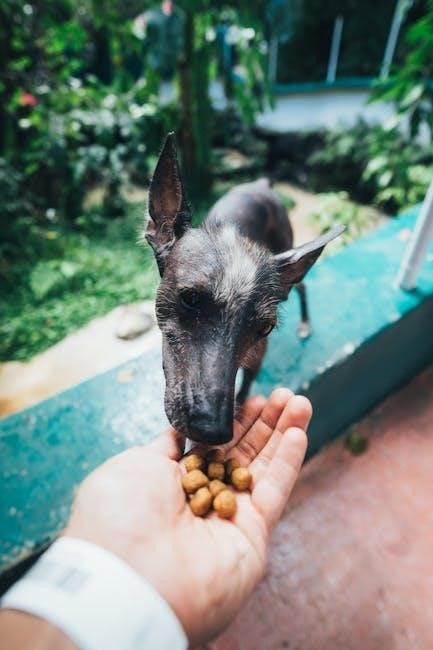
Harringtons Puppy Food Feeding Guide provides essential nutrition for healthy growth‚ offering balanced meals tailored to puppies’ developmental stages. It ensures proper digestion‚ energy‚ and overall well-being.

Overview of Harringtons Puppy Food

Harringtons Puppy Food is a high-quality‚ nutritionally balanced diet designed to support puppies’ growth and development. Made with natural ingredients‚ it avoids artificial colours‚ flavours‚ and preservatives‚ ensuring a wholesome meal. The recipe features turkey as a primary protein source‚ promoting healthy digestion and energy levels. Harringtons Puppy Food is formulated to meet the nutritional needs of puppies during their critical growth phases‚ with added vitamins and minerals for strong immune systems and healthy bones. It is available in dry kibble form‚ making it convenient for daily feeding. This food is widely recommended by pet owners and veterinarians for its digestibility and nutrient-rich profile‚ ensuring puppies thrive from an early age.
Importance of Proper Feeding for Puppies
Proper feeding is crucial for puppies to ensure healthy growth‚ energy‚ and immune function. A balanced diet supports muscle development‚ strong bones‚ and optimal digestion. Feeding the right amounts at the correct stages prevents obesity and stunted growth. It also aids in maintaining skin health and coat condition. Proper nutrition helps puppies thrive‚ reducing the risk of developmental issues. Consistency in feeding schedules and portion sizes ensures steady growth and prevents digestive upsets. High-quality puppy food‚ like Harringtons‚ provides essential nutrients tailored to their needs‚ fostering overall well-being and setting the foundation for a healthy adult life. Proper feeding habits early on contribute to long-term health and vitality.

Nutritional Requirements for Puppies
Puppies need a diet rich in protein‚ healthy fats‚ and essential vitamins and minerals to support growth and energy; Balanced nutrition ensures optimal development and overall health.
Protein Sources in Harringtons Puppy Food
Harringtons Puppy Food is formulated with high-quality protein sources such as turkey and chicken‚ ensuring puppies receive essential amino acids for muscle growth and development. These protein-rich ingredients are easily digestible‚ promoting healthy energy levels and overall well-being. The food avoids low-quality fillers‚ focusing instead on whole meats to maximize nutritional value. This approach supports strong immune function and aids in maintaining a balanced diet tailored to a puppy’s needs. Harringtons commitment to using natural and wholesome protein sources ensures that puppies get the best start in life‚ with all the necessary nutrients for optimal growth and vitality.
Fat and Carbohydrate Content for Energy
Harringtons Puppy Food contains balanced levels of fat and carbohydrates to provide sustained energy for growing puppies. The fat content‚ derived from animal sources‚ supports skin health and coat condition while fueling active play. Carbohydrates‚ such as brown rice and oats‚ offer easily digestible energy‚ helping puppies maintain vitality throughout the day. These ingredients work together to ensure puppies have the stamina needed for growth and development. Harringtons avoids artificial additives‚ ensuring a natural and wholesome approach to energy provision. This balanced blend of fats and carbs supports overall health‚ making it an excellent choice for puppies requiring consistent energy levels for optimal growth and activity.
Vitamins and Minerals for Growth
Harringtons Puppy Food is enriched with essential vitamins and minerals to support healthy growth and development. These nutrients are vital for building strong bones‚ teeth‚ and immune systems. Vitamin D and calcium are key for bone development‚ while other minerals like phosphorus and potassium support overall health. The formula includes antioxidants to protect against free radicals‚ promoting long-term well-being. Harringtons ensures a balanced mix of vitamins and minerals‚ providing puppies with the necessary building blocks for growth. This careful formulation helps puppies thrive‚ supporting their natural development and ensuring they reach their full potential. The inclusion of these nutrients makes Harringtons a comprehensive and nutritious choice for puppies.
Feeding Schedule Based on Puppy Stages
Harringtons Puppy Food offers a feeding schedule tailored to meet the nutritional needs of puppies at different growth phases‚ ensuring optimal development and health.

Feeding Puppies from 8 to 12 Weeks
Feeding puppies from 8 to 12 weeks requires careful attention to their rapid growth and development. At this stage‚ puppies transition from milk to solid food and need nutrient-rich meals to support their energy needs and immune system. Harringtons Puppy Food is specifically formulated to meet these requirements‚ offering a balanced mix of protein‚ fats‚ and carbohydrates. Puppies in this age group should be fed 4 small meals daily‚ gradually increasing portion sizes as they grow. The food should be softened with warm water or a low-sodium meat broth to ease digestion. Consistency is key to preventing digestive upset and ensuring proper nutrient absorption. Always provide fresh water alongside meals to keep your puppy hydrated and thriving during this critical growth phase.
Feeding Puppies from 3 to 6 Months
Feeding puppies from 3 to 6 months involves maintaining a consistent and nutrient-rich diet to support their continued growth. At this stage‚ puppies typically transition to three meals a day‚ as their digestive systems mature. Harringtons Puppy Food provides the necessary balance of protein‚ fats‚ and carbohydrates to fuel their energy levels and physical development. Portion sizes should be adjusted gradually‚ following the feeding guide on the packaging‚ to ensure proper weight management and prevent overfeeding. It’s essential to monitor your puppy’s growth and adjust portions accordingly. Additionally‚ ensure fresh water is always available to keep your puppy hydrated and healthy during this active growth phase.
Feeding Puppies from 6 to 12 Months
Feeding puppies from 6 to 12 months involves gradually transitioning to a more adult-oriented diet while maintaining balanced nutrition. At this stage‚ puppies typically reduce their meal frequency to twice a day‚ as their growth rate slows. Harringtons Puppy Food continues to provide essential nutrients‚ supporting muscle development and energy levels. Portion sizes should be adjusted to prevent overfeeding‚ ensuring a healthy weight. It’s crucial to monitor your puppy’s growth and adjust portions accordingly. Towards the end of this period‚ you can begin introducing Harringtons Adult Dog Food to ease the transition. Always consult your vet for personalized feeding advice to ensure optimal health during this critical growth phase.

Portion Control and Measurement
Accurate portion control ensures puppies receive the right amount of nutrients for healthy growth. Use a measuring cup to maintain consistency and prevent overfeeding or underfeeding.
Factors Influencing Portion Sizes
Portion sizes for puppies depend on factors like breed size‚ age‚ weight‚ and activity level. Larger breeds require more food‚ while smaller breeds need less. Age plays a crucial role‚ as puppies grow rapidly and their nutritional needs change. Weight is a key indicator for portion adjustment‚ ensuring proper growth without overfeeding. Activity levels also influence calorie intake‚ with more active puppies requiring larger portions. Metabolism and individual variation in growth rates further shape feeding amounts. Monitoring these factors helps tailor meals to meet each puppy’s unique needs‚ ensuring optimal health and development.
How to Adjust Portions as Puppies Grow
As puppies grow‚ their portion sizes need to be adjusted to match their developmental stage. Monitor their weight and body condition regularly‚ increasing or decreasing food amounts accordingly. Puppies that are more active or have higher metabolisms may require larger portions‚ while less active ones may need smaller servings. Gradually transition from frequent‚ smaller meals to fewer‚ larger ones as they mature. Typically‚ puppies under 6 months require 3-4 meals daily‚ while those over 6 months can switch to 2 meals. Adjustments should be gradual to prevent digestive upset‚ and portion sizes should align with the feeding guide provided by Harringtons. Consult a vet for personalized advice to ensure optimal growth and health.

Transitioning to Harringtons Puppy Food
Transitioning to Harringtons Puppy Food should be done gradually over 7-10 days to prevent digestive upset. Mix increasing amounts of Harringtons with their current food‚ ensuring a smooth transition.
When to Start Feeding Harringtons
Puppies can start feeding on Harringtons Puppy Food from 8 weeks of age‚ ensuring they receive essential nutrients for growth. Introduce Harringtons gradually‚ mixing it with their current food to prevent digestive upset. Transitioning too early or late can affect their development. Always consult a veterinarian before making dietary changes to ensure the best start for your puppy’s health and well-being.
How to Introduce Harringtons Gradually
Introducing Harringtons Puppy Food gradually is crucial to ensure a smooth transition for your puppy’s digestive system. Start by mixing a small portion of Harringtons with their current food‚ increasing the ratio over 7-10 days. Begin with 25% Harringtons and 75% of their current food on day one‚ then adjust to 50-50 by day three. By day seven‚ your puppy should be fully transitioned to 100% Harringtons. Monitor their digestion and stool quality during this period. If any adverse reactions occur‚ slow the transition or consult a veterinarian for advice. This gradual approach helps prevent digestive upset and ensures your puppy adapts well to the new diet.
Monitoring Transition for Digestive Health
Monitoring your puppy’s digestive health during the transition to Harringtons Puppy Food is crucial. Watch for stool consistency‚ appetite changes‚ and energy levels. Note any signs of upset‚ such as diarrhea or vomiting. If issues persist beyond a few days‚ consult your vet. Adjust the transition pace if needed to ease digestion. A 7-10 day gradual introduction allows the system to adapt without stress. Look for consistent energy and normal stools. Ensure your puppy remains comfortable and healthy. Regular observation helps identify any problems early. By closely monitoring‚ you support a successful transition and your puppy’s overall well-being and digestive comfort.